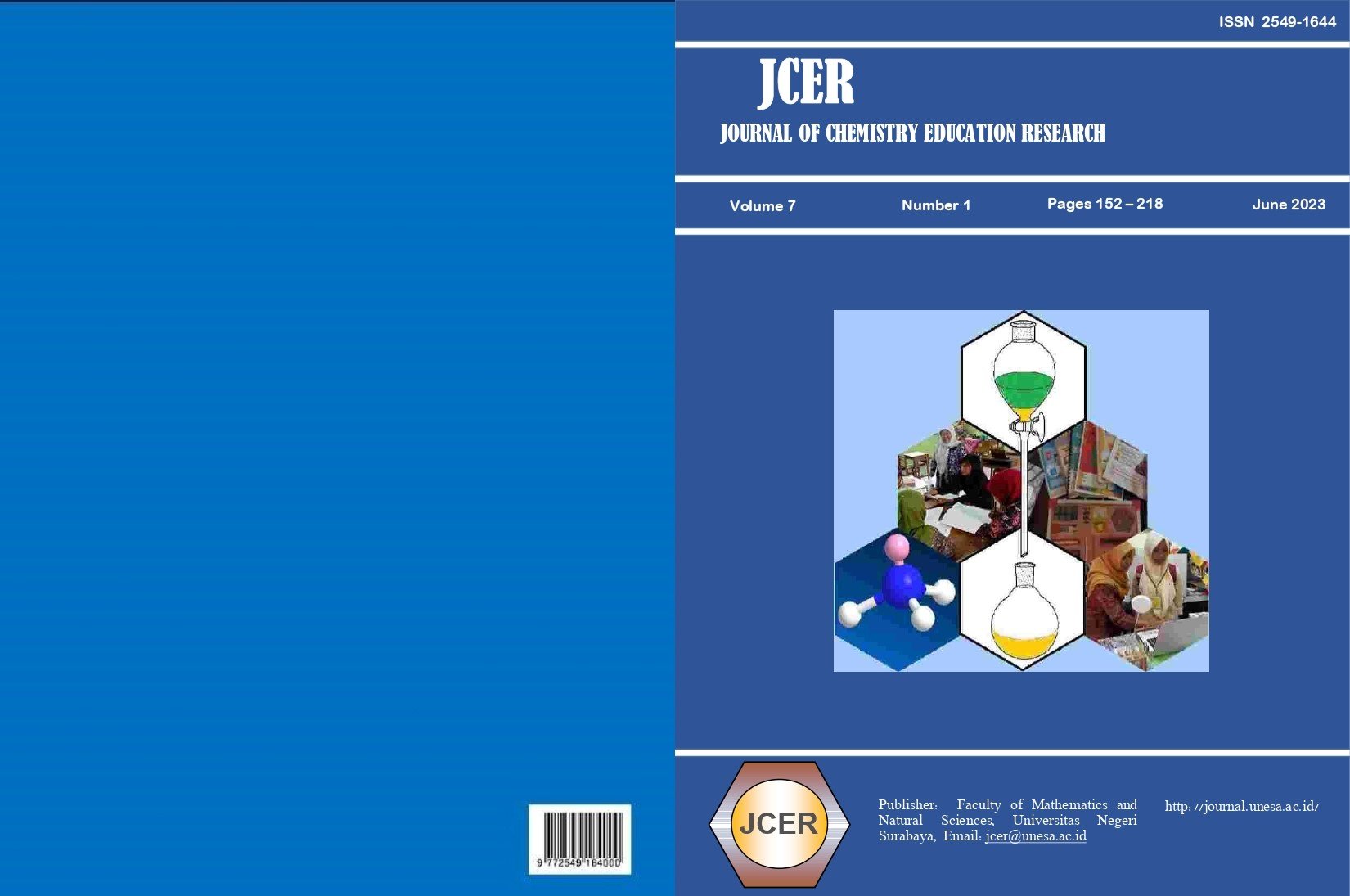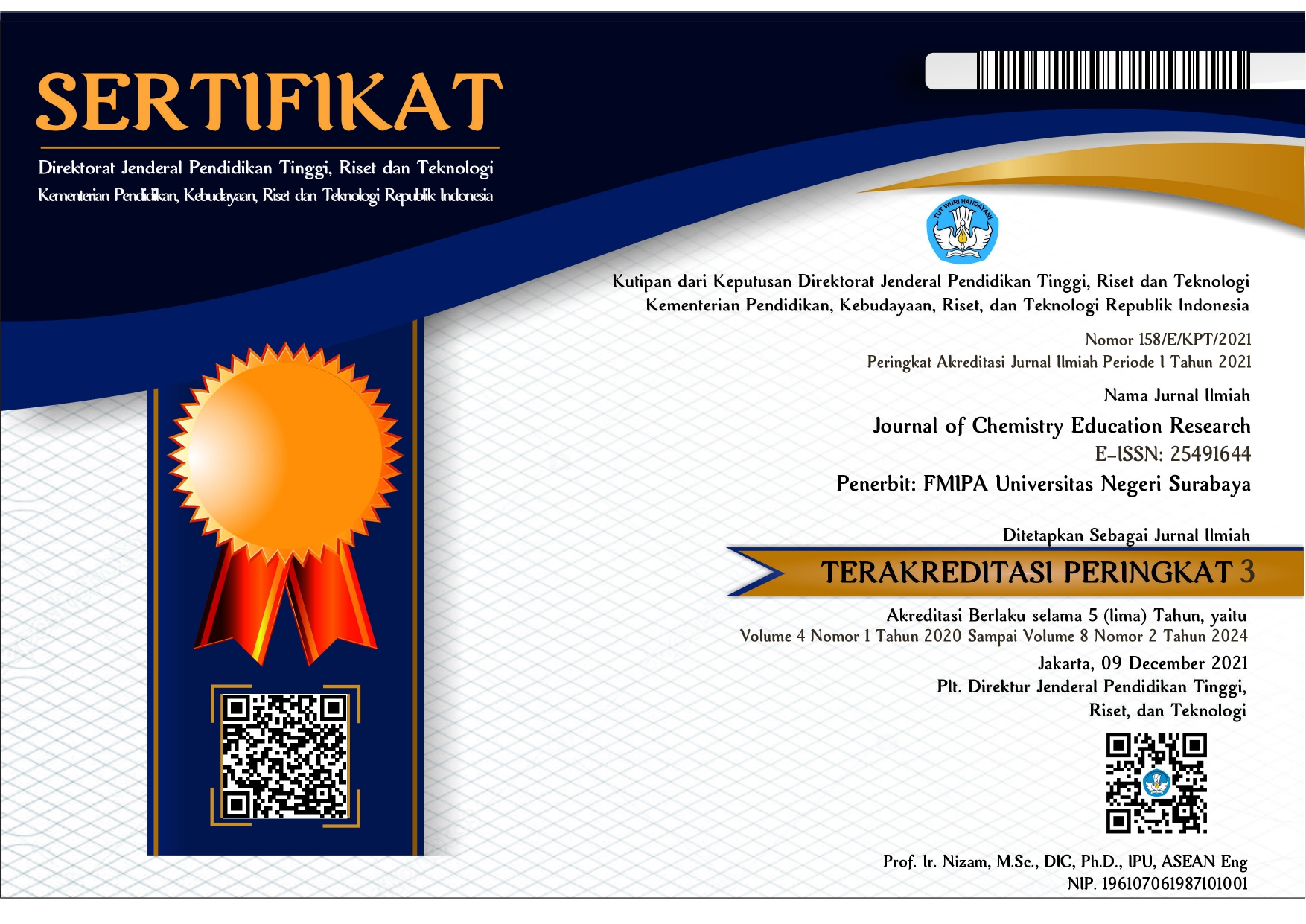THE EFFORTS OF CHEMISTRY EDUCATION STUDENTS IN PREPARING TO BECOME PROFESSIONAL TEACHERS IN THE FUTURE
DOI:
https://doi.org/10.26740/jcer.v7n1.p195-203Keywords:
Professional Teacher, Chemistry, Pedagogic CompetenceAbstract
The purpose of this study is to map the efforts made by students of prospective chemistry teachers in preparing themselves to become professional teachers in the future. This research is naturalistic and is a case study. This research is carried out naturally during the ongoing lecture program (natural setting). The research was carried out when students took part in professional educational lectures in the intermediate semester of 2022. The research participants consisted of 17 chemistry education students. As the main instrument, researchers are a lecturer of professional education courses. Data is collected through documentation methods in the form of essays and then analyzed and interpreted qualitatively. The research results include student activities following professional, pedagogical, social, and personality competence. The most activity is related to pedagogic competence, while the lowest is related to social and professional competence. Needs to be developed grows activities that follow the four competencies proportionally in prospective teacher students. For students' social and professional competence, prospective chemistry teachers are generally at a stage that still needs improvement.
References
Ulyah, S. M., Sediono, S., Ana, E., Sholihah, N., & Niswatin, K. (2021). Improving the Competency of High School Teachers in Understanding and Designing Questions Based on Minimum Competency Assessment in Babat Lamongan District. MUST: Journal of Mathematics Education, Science and Technology, 6(1), 55. https://doi.org/10.30651/must.v6i1.7773
Imaduddin, M. (2018). Analisis miskonsepsi submikroskopik konsep larutan pada calon guru kimia. Edu Sains: Jurnal Pendidikan Sains & Matematika, 6(2), 1. https://doi.org/10.23971/eds.v6i2.983
Shidiq, A. S., Permanasari, A., Hernani, & Hendayana, S. (2021). Chemistry teacher responses to learning in the COVID-19 outbreak: Challenges and opportunities to create innovative lab-work activities. Journal of Physics: Conference Series, 1806(1). https://doi.org/10.1088/1742-6596/1806/1/012195
Kemendikbud. (2014). Pedoman Guru Mata Pelajaran Kimia. In Pusat Kurikulum dan Perbukuan Badan Penelitian dan Pengembangan Kementerian Pendidikan dan Kebudayaan.
Gunawan, R., Suyitno, S., & Supriyadi, S. (2019). Nilai Pendidikan Karakter Religius Novel Rantau 1 Muara Karya Ahmad Fuadi. POTENSIA: Jurnal Kependidikan Islam, 4(2), 138. https://doi.org/10.24014/potensia.v4i2.5577
Nurfitka, D., Asriati, N., & Harjanti, D. T. (2022). Analisis Kompetensi Sosial Guru Dalam Pembelajaran Geografi Pada Masa Pandemi Covid-19. Jurnal Pendidikan Sosiologi Dan Humaniora, 13(1), 155. https://doi.org/10.26418/j-psh.v13i1.52566
Teo, T., Unwin, S., Scherer, R., & Gardiner, V. (2021). Initial teacher training for twenty-first century skills in the Fourth Industrial Revolution (IR 4.0): A scoping review. Computers and Education, 170. https://doi.org/10.1016/j.compedu.2021.104223
.[31] Lamb, S., Jackson, J., & Rumberger, R. (2015). ISCY Technical Paper : Measuring 21 st Century Skills in ISCY. Centre for International Research on Education Systems
Winarni, S. (2019). Keefektifan Concept Approval Strategy dalam mencegah miskonsepsi materi sifat koligatif larutan [Universitas Negeri Malang]. http://repository.um.ac.id/id/eprint/115627.
Ebbing, D. D., & Gammon, S. . (2009). General Chemistry, 9thEd. Houghton Mifflin Company
Downloads
Published
Issue
Section
License

This work is licensed under a Creative Commons Attribution-NonCommercial 4.0 International License.
 Abstract views: 203
,
Abstract views: 203
, PDF Downloads: 285
PDF Downloads: 285



